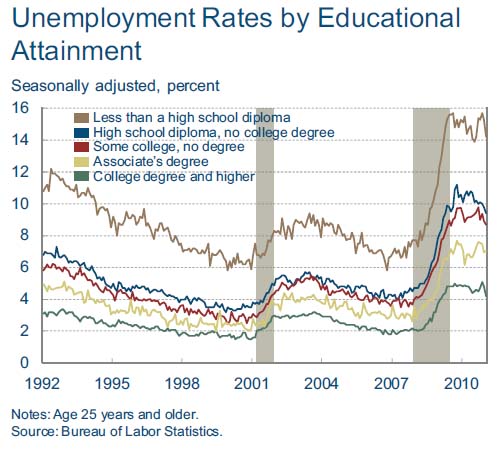Executive Summary
As the cost of college continues to rise, and more and more students graduate in debt, and then try to enter a difficult job market, many have begun to question: is college actually worth the price?
The basic formulation is pretty straightforward: by going to college, you spend 4(+?) years not in the labor force, and spend money outright on the cost of college itself; in return, you have a higher employment income for all the years that follow college until you retire, which in theory can make up the college tuition outflows plus the years of foregone earnings.
However, as college gets more expensive, and the "bonus" to future salary for having a college education doesn't seem to be what it once was (especially for many liberal arts degrees), it's getting harder to make the case that college is still worth it.
There's just one problem: while you earn one future income without a college education, and a higher future income with a college education, neither projection accounts for the crucial income risk of unemployment.
The inspiration for today's blog post comes from a series of recent articles, from the Huffington Post to the popular Freakonomics blog, questioning whether the cost of a college education is still worth it, even as the cumulative amount of student loan debt in the country accumulates up to a mind-boggling level.
Yet at the same time, I was fascinated by a recent chart I found on the NY Times Economix blog, showing how unemployment in today's environment varies by level of educational attainment.
As the chart above highlights, there are dramatic differences in how varying educational attainment levels are weathering the economic storm. Those who have no high school diploma are facing unemployment rates in excess of 14%. Those with a high school diploma are faring slightly better, with an unemployment rate just under 10%. Yet those with a college degree have an unemployment rate that has "spiked" to a mere 4% (and notably, it's difficult to keep unemployment for any category below the 2% to 4% range, as that level of structural unemployment is simply inherent in the time it takes any average member of the labor force to change jobs, move for family or personal circumstances, etc.).
This adds an important factor to the debate about whether college education is "worth it" or not - the idea that a college education isn't just about getting a higher average salary, but also represents a material reduction in the risk of being unemployed for one or more stints throughout a 40+ year working career. As the classic comparison goes, the college graduate gives up 4 years in the workforce, and incurs the cost of college itself, in exchange for a higher salary through the remainder of his/her working career. But what if the reality is that the average number of working years for the non-college-graduate is not 4 years longer on average, but only a fraction of that, due to a significant difference in unemployment stints over the span of a multi-decade career?
Of course, this doesn't mean I'm a fan of just anyone accumulating tens or hundreds of thousands of dollars of college debt. And as a recent study by the Georgetown University Center on Education and the Workforce has shown, there is also a significant disparity between average earnings (and I'd venture to say, unemployment rates) amongst various majors and courses of study within college. And as another chart from the aforementioned NY Times Economix blog post shows, once unemployed the average duration of unemployment is roughly comparable at all levels of educational attainment. So the benefit is not that the college educated have shorter unemployment stints; it's just that they're less likely to enter into unemployment in the first place.
Nonetheless, to me this represents a major shift in how we look at the value of college. We can't just measure the results by a difference in the average income of the college graduate versus the high school diploma. It's also about what the student's major/course of study is, and it's also about the fact that after college, there is a material difference in unemployment rates by educational attainment level. So given one or two recessions every decade on average, a college degree represents a significant amount of unemployment risk management, and that's should be part of the results we look at in evaluating the value of college.
So what do you think? Do you view the cost and value and college in another light when looking from the perspective of not just earnings differences, but unemployment differences as well? Do you think the cost of college is too high for the value it provides? Is the cost of college on an unsustainable track?





